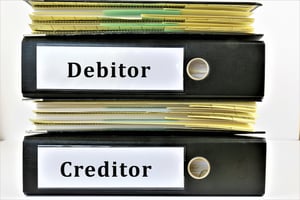 A person who files for bankruptcy (a.k.a. the “debtor”) is protected from creditors by the “automatic stay” which begins on the day they file their petition with the bankruptcy court.
A person who files for bankruptcy (a.k.a. the “debtor”) is protected from creditors by the “automatic stay” which begins on the day they file their petition with the bankruptcy court.
The automatic stay is a court order that prohibits creditors from collecting on debts owed by the debtor, with very limited exceptions (i.e. creditors to whom the debtor owes alimony or child support are not stopped by the automatic stay).
Under the automatic stay, creditors cannot take any action to collect on the debt including, but not limited to, calling the debtor, sending bills/letters, filing a lawsuit, garnishing wages, repossessing the debtor’s car, or foreclosing on their home. The automatic stay typically lasts until the debtor’s bankruptcy case is finished, and then, is replaced by an order permanently discharging their debts.
Violating the automatic stay or discharge order, especially if done intentionally, can have serious consequences, including subjecting the creditor to sanctions, such as fines and court costs, on top of having to return any property taken from the debtor.
Sometimes, a creditor can file a motion asking the court to “lift” the automatic stay. If this motion is granted by the court, the creditor will then be allowed to pursue collection of the debt just as if the bankruptcy was never filed. Common situations where the automatic stay is lifted by the court are when the debtor fails to make car, mortgage or rent payments during the bankruptcy. In cases such as these, the court will likely grant the creditor’s motion and allow the creditor to protect its interests by retaking the collateral securing the debt (i.e. in a vehicle repossession or home foreclosure) or evicting a delinquent tenant.
Creditors, even when subject to the automatic stay, have a limited right to be involved in the bankruptcy case. Creditors may file claims for payment with the court. In a chapter 7 bankruptcy case, the trustee will pay creditors a proportionate share of the funds received from liquidating the debtor’s non-exempt property, if any, assuming the creditors file timely claims. In a chapter 13 bankruptcy case, the bankruptcy trustee will pay creditors, who file timely claims, a portion of the money received from the debtor’s regular payments.
A creditor may also file an objection to the debtor’s chapter 13 plan if it feels that it is not being treated fairly by the plan. In both chapter 13 and chapter 7 cases, creditors, as interested parties, have the right to file motions with the court requesting that other interested parties, usually the debtor, cooperate with the trustee, turn over nonexempt property, abide by the Bankruptcy Code and Rules, and even, for the court to impose sanctions against noncompliant parties. For example, a creditor could file a motion asking the court to deny a debtor’s discharge if there is evidence that the debtor committed a wrongful act, or acted in bad faith, to the harm of creditors. Typically, these types of motions are made by the trustee, however.
Creditors also have the right to show up at the debtor’s “meeting of creditors” (a.k.a. the “341 meeting”) and are allowed to ask questions of the debtor at that meeting. However, creditors rarely attend these meetings, and generally only do so in unusual circumstances, such as when they have a valid legal objection to the discharge of the debtor’s debt. For instance, a creditor may have a valid legal objection to the discharge of a debt that was incurred fraudulently by the debtor. Common examples of this would be lying on a loan application or incurring a large amount of credit card debt right before filing bankruptcy, particularly if there was no intent to repay it.
A creditor may also object to a debt incurred from the debtor’s willful and malicious acts that cause damage to the creditor’s property, or to the creditor themselves. Debts incurred by fraud or by such harm-causing willful and malicious acts are not dischargeable, but only if the creditor actually objects to the debt. To do so, the creditor must file an “adversarial action,” which is essentially a separate lawsuit within the bankruptcy case to have the court determine whether the debt will be discharged or not.
CALL NOW FOR A FREE STRATEGY SESSION FROM A MN BANKRUPTCY LAWYER AT LIFEBACK LAW FIRM
This is a very broad overview of creditor’s rights in a bankruptcy case and is not designed to be comprehensive. It is a very good idea to discuss this topic with an experienced bankruptcy attorney, who can more specifically explain the bankruptcy process and what rights your creditors will have in your particular case. See us at LifeBackLaw.com


